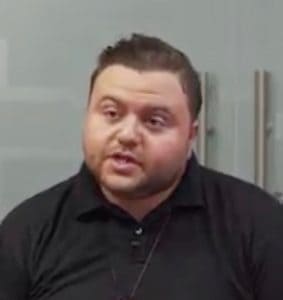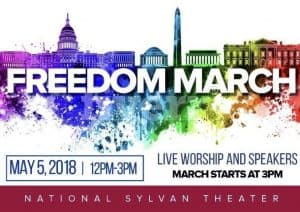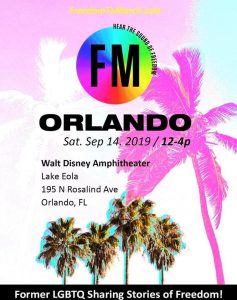Freedom March Orlando, September 14, 2019
[Freedom March is] a public pushback [sharing the message] that people can be free not only from homosexuality and transgender lives but from anything. That it is through the power of the Holy Spirit, and it’s through the grace of Jesus Christ of Nazareth. The heart of God for LGBTQ people is the same that it is for all people. His heart loves them, and He wants all of them. And [what] I want to say to them is: you’re so special, you are worth more than rubies and jewels and diamonds. This is the Gospel for all people.
—Jeffrey McCall, founder of Freedom March—
Key point: “[I]f anyone is in Christ, he is a new creation; old things have passed away; behold, all things have become new” (2 Cor. 5:17).
Jeffrey McCall is a former homosexual. When he was 12, he started wrestling with same-sex attraction. After he turned 15, he yielded to his base impulses and developed a habitual pattern of homosexual behavior. As a young adult, living in Nashville for five years, Jeffrey found plenty of opportunities to shop, party, and engage in gay encounters. He became addicted to drugs as well. Jeffrey is six-feet-four-inches tall, but his weight dropped to around 160 pounds! He knew that if he didn’t remove himself from those surroundings, his lifestyle choices would kill him.
McCall moved to Georgia and enrolled in college. After completing the requirements for his 4-year degree, he still was involved in homosexuality. Now, though, it had taken on a new expression. Jeffrey’s alter-ego was “Scarlett.”
Being somewhat familiar with the drag scene because he’d had a relative who had participated in drag shows, Jeffrey began performing as Scarlett and even dated other men as he acted out the transgender role he’d embraced. All of this was occurring even as he continued his studies as a graduate student. He became convinced he was a woman trapped in a man’s body. “Scarlett” was his identity. Extremely promiscuous, he became a heavy drinker as well.
Yet Jeffrey McCall was not happy. He’d followed his base impulses and fed his raw appetites with reckless abandon, only to hit “rock bottom.” After getting thoroughly drunk one evening, he contemplated suicide. He wound up in the psychiatric wing of the local hospital and spent two days there. He knew he truly was at the end of his rope.

For some time, however, in the privacy of his own room, Jeffrey had been doing something counterintuitive he’d told no one about. He was listening to a preacher on television and on YouTube. God used that preacher’s sermons to convict Jeffrey of his sinful actions and lifestyle. Everything came to a head late one night. McCall explains,
[I]t was around the last semester of graduate school, I was sitting in my room and I was just crying. It was really, really late at night. And I was just weeping. I spoke to God through my crying and weeping, and I said, “God, I know people live for you, not just go to church on Sunday, not just play a religious game, like something happened and their life was transformed. And I said, ‘Will I ever live for you?’ My voice went silent. My thoughts stopped. And I heard God say, ‘Yes, you will live for me.’”
Even though Christ saves instantaneously, His regenerating work in the lives of many of His followers becomes evident gradually. Jeffrey McCall made a 180-degree turn, but his about-face was a process, not an overnight event. After a period of two to three months, he took everything that represented his identity as Scarlett “to a dumpster and threw it all away—the clothes, the hair, the make-up, the jewelry, the shoes, my whole identity—I threw it away to follow Jesus.”
He had told the Lord,
“If I follow you, it will be all the way. I don’t do things half-way. I didn’t do things half-way in the world; I’m not going to do things half-way with you.”
If I follow you, [Lord,] it will be all the way. I don’t do things half-way. I didn’t do things half-way in the world; I’m not going to do things half-way with you.
—Jeffrey McCall—
Released from Bondage!
 What does Jeffrey McCall do now? He’s founded his own outreach organization, which he calls “For Such a Time Ministry.” The name echoes Mordecai’s words to Esther in Esther 4:14 — “Yet who knows whether you have come to the kingdom for such a time as this?” Jeffrey also is the founder of the Freedom March (FM), a movement where he organizes and leads events that give a platform to former homosexuals who have been transformed from the inside-out by Jesus Christ. You can read the Freedom March Vision Statement here. The first Freedom March was held in Washington DC on May 5, 2018. The tiny crowd it drew did not deter enthusiasm or excitement among participants. You can watch Jeffrey give his testimony at that event here. Take note! This movement is growing! Three other Freedom March events also have been held:
What does Jeffrey McCall do now? He’s founded his own outreach organization, which he calls “For Such a Time Ministry.” The name echoes Mordecai’s words to Esther in Esther 4:14 — “Yet who knows whether you have come to the kingdom for such a time as this?” Jeffrey also is the founder of the Freedom March (FM), a movement where he organizes and leads events that give a platform to former homosexuals who have been transformed from the inside-out by Jesus Christ. You can read the Freedom March Vision Statement here. The first Freedom March was held in Washington DC on May 5, 2018. The tiny crowd it drew did not deter enthusiasm or excitement among participants. You can watch Jeffrey give his testimony at that event here. Take note! This movement is growing! Three other Freedom March events also have been held:
-
-
- one in Los Angeles on November 4, 2018;
- another one in Washington DC on May 25, 2019 (also go here), and
- yet another at the Minnesota capitol in St. Paul on June 23, 2019.
-
Stay tuned, because, as we have noted, this movement is taking off! Another Freedom March is being planned for this Saturday, September 14, 2019 in Orlando, Florida at Lake Eloa Park. Luis Ruiz and Angel Colon, Orlando residents who were victims of the Orlando Pulse shooting, will serve as hosts for the event.
Freedom to Speak
Christians should be in prayer for this event and the people who are participating in it. We must support our brothers and sisters in Christ as they share their stories of deliverance. While some have tried to use the Freedom March to focus on so-called “conversion therapy,” the Freedom March isn’t about that, but about the transforming power of Jesus Christ.1
Thus far FM participants apparently have been able to speak out boldly and freely regarding their own experiences, but we must not be naïve. To those supporting LGBT ideology, former homosexuals are seen as a very real threat—not because of anything they might do to harm members of the gay community, but because of their very existence! Anyone who claims to be a former homosexual challenges the militant LGBT narrative that homosexuals are “born that way” and that change is impossible (despite evidence to the contrary). Not all homosexuals share this perspective, but militant gay activists do.
“This Is Who We Are!”
Former homosexuals, however, simply are exercising their right to speak and to share their stories with others. Often you’ll hear a homosexual or gay activist say, “This is who I am,” or, collectively gays will say, “This is just who we are.” People and groups saying this will ask to be respected and treated with dignity—and in our culture, they are. Moreover, they should be!
Men and women who have left homosexuality and who no longer practice it have a right to say the very same thing regarding their own journeys and their own identities as former homosexuals, former transgender individuals, and men and women now living as heterosexuals. This ought to be easy to understand. The people who’ve made these journeys see them as deeply personal—because they are! Furthermore, Christians find their primary identity in Christ, and they want the right to identify as His followers, whether their message is popular or not.
Many probably will scratch their heads in bewilderment over the stories shared at Freedom March. Others will resist and oppose the FM message strongly. Yet some—even some who identify as LGBT individuals—will respond positively, or they will begin to consider carefully what they have heard.
Let’s pray, not only for those sharing their stories at FM, but also for those who might hear the stories, or hear about FM itself.
God is using and growing this movement! May He bless the Orlando event and work mightily through it!
Copyright © 2019 by B. Nathaniel Sullivan. All rights reserved.
Unless otherwise indicated, Scripture has been taken from the New King James Version®. Copyright © 1982 by Thomas Nelson, Inc. Used by permission. All rights reserved.
top image credit: www.freedomtomarch.com
1We have discussed on numerous occasions LGBT activists’ use of the term “conversion therapy” and the horrors associated with it to demonize all therapy—even talk therapy—that seeks to help clients overcome unwanted same-sex attraction. Here is one example. For many who have come to Christ out of homosexuality, though not for all, therapy has been extremely helpful. The main point of our discussion has been that government has no business intervening in the client-therapist relationship. Some participants in the FM would support therapy, but others would not. That said, the FM takes no position on therapy. As we have said, it seeks to give a platform to former homosexuals who have been transformed from the inside-out by Jesus Christ.


Be First to Comment